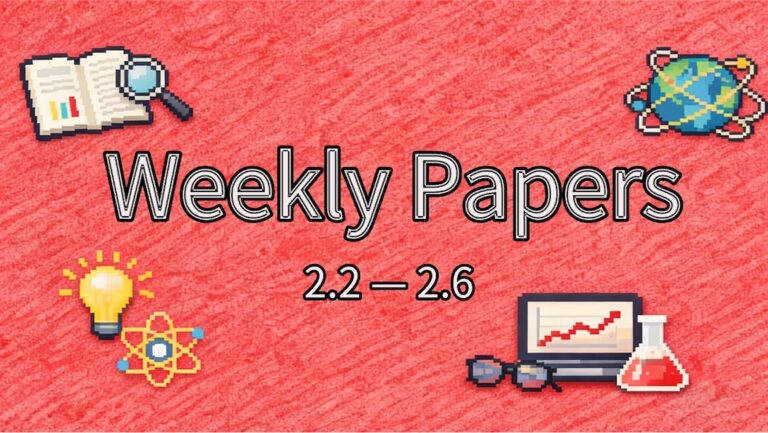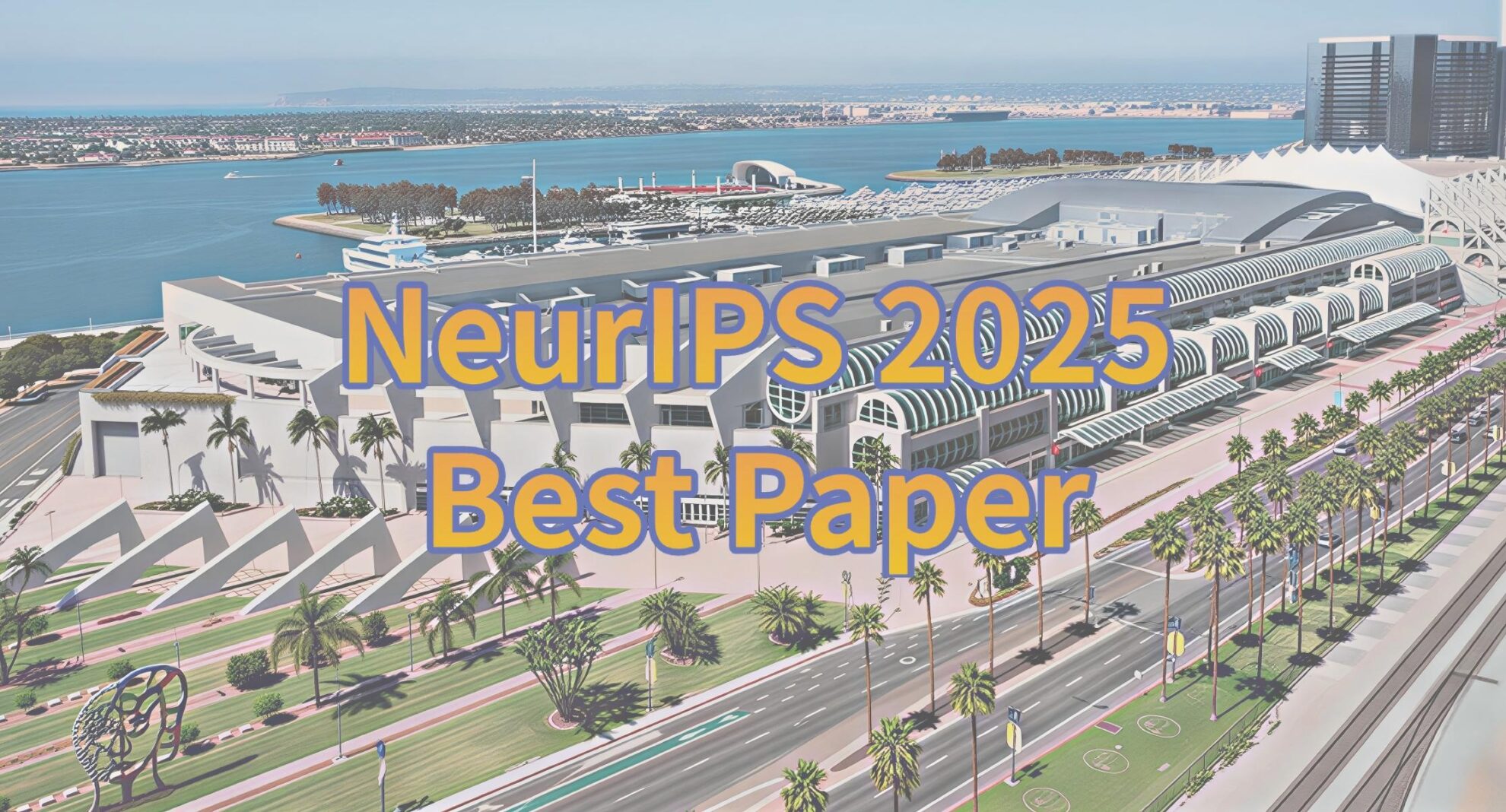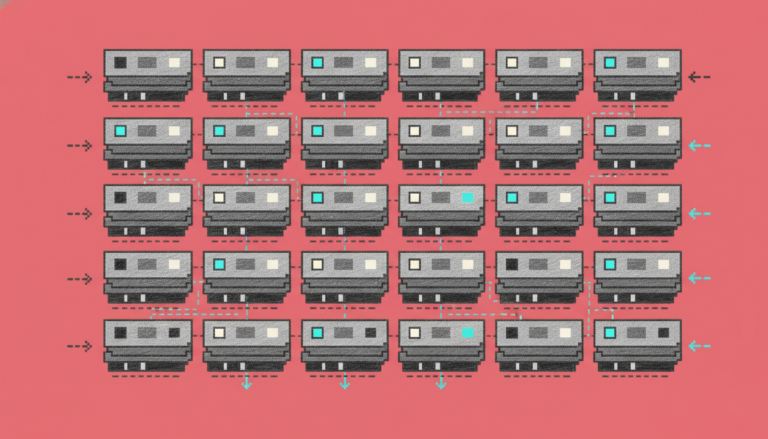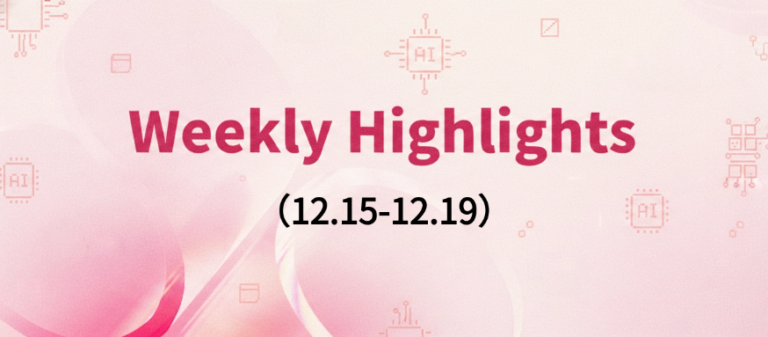Command Palette
Search for a command to run...
East China Normal University Undergraduates Create a Platform for AI Agent Research papers. Awesome AI Agents Live Offers a Platform for Reading the Latest Papers on AI agents.

As AI agents become a hot topic in academia and industry, researchers are faced with a constant stream of new papers and experimental results. Quickly tracking, categorizing, and navigating this research is becoming a major challenge.
Based on this dilemma,Junior student at Shanghai Institute of Artificial Intelligence and Finance, East China Normal UniversityZou Congyuan and his advisor, Wu Zonghan, developed a lightweight platform called "Awesome AI Agents Live" that provides researchers, engineers, and students with a real-time updated directory of papers.Help them grasp the latest developments in the field of AI Agent more efficiently.
GitHub link:
https://github.com/SAIFS-AIHub/Awesome-AI-Agents-Live
Accurately targeting three core audiences: Solving information screening anxiety in the LLM-based agent field
The target audience of "Awesome AI Agents Live" is not the general "academic researchers".Instead, it precisely targets three groups with clear information needs in the field of LLM-based Agents: researchers, engineers, and students.Its functional design deeply fits the core pain points of each type of user.
Currently, research directions in the field of AI Agents are highly segmented, and breakthroughs in each sub-field may be replaced by new papers within a few days. For scholars engaged in basic research on AI Agents, avoiding duplication of innovation and keeping up with the latest developments are two core needs. For engineers who implement AI Agent technology, they care about whether the methods in the papers are feasible and what technical limitations exist. As the main audience group, students in the field of AI Agents face the biggest challenge of being faced with a huge number of papers and not knowing where to start. Lacking an understanding of the field framework, they easily fall into the dilemma of reading multiple papers but still not forming a system.
Based on these needs and pain points, the platform serves as a pre-information portal. Researchers can use the catalog to understand the core value positioning and research direction of a paper before reading in depth, and quickly browse the abstracts, key insights, and strengths and weaknesses of the papers published that day, significantly reducing the cost of information screening.
Positioning "Lightweight Real-time Navigation Tool": Filling the gap between academic databases and efficiency needs
In the information ecosystem of AI Agent research, "Awesome AI Agents Live" is not intended to replace traditional academic databases such as arXiv and Google Scholar.Instead, it is positioned as a "lightweight real-time navigation tool" to fill the gaps in "efficient screening" and "real-time updates" of existing tools, forming a closed loop of "navigation - screening - intensive reading" for obtaining academic information.
The core advantage of traditional academic databases is "comprehensiveness" - they include almost all publicly available academic papers, but they are still slightly lacking in terms of paper classification and updating effectiveness.However, "Awesome AI Agents Live" takes the opposite approach and focuses on "precision".By reducing the time spent searching for papers to the time spent reading them, we are reshaping the efficiency of academic information acquisition in the field of AI agents. Furthermore, we provide an introductory analysis for each paper, allowing scholars to focus more on in-depth understanding and innovative thinking. This efficiency-oriented approach perfectly aligns with the rapidly evolving and fiercely competitive research landscape in the field of AI agents, making it an essential efficiency tool for all participants.
It’s important to note that the paper’s abstract and classification are generated by AI, which may be potentially inaccurate. Users should still refer to the original paper when citing it. This also reflects the tool’s positioning: to assist research, not replace in-depth reading.
Three core advantages: real-time, structured, easy to read, and lightweight
The competitiveness of "Awesome AI Agents Live" comes from its three core advantages built around "efficiently obtaining AI Agent paper information", and each advantage is supported by specific functions.
Real-time: Daily real-time updates to keep up with the research pace
Research in the field of AI agents is moving at an incredibly fast pace. If industry updates lag behind, researchers may miss key breakthroughs. Powered by hyper.ai, Awesome AI Agents Live leverages out-of-the-box computing power to ensure daily updates, providing timely access to the latest AI agent papers.
In terms of paper sources, the platform currently covers core channels such as arXiv, OpenReview, and major top conferences (such as NeurIPS, ICML, AAAI).Ensure that the included papers are both timely and academically authoritative; in the future, the source range will be further expanded to include more mainstream paper publishing platforms and top conference results in more fields, so as to capture the research trends in the field in all aspects.
As the field of AI Agent is developing rapidly, high-frequency updates combined with diverse source channels can ensure that users are exposed to the latest and most comprehensive research results as soon as possible, avoiding missing out on important academic developments due to information lags or a single source, and allowing users to always stand at the forefront of field research.
Structuralization: Authoritative classification + multi-dimensional sorting to achieve "precise positioning"
Structuring is the core method used by Awesome AI Agents Live to address information overload, and it is embodied in two aspects:
The first is the authoritative classification system:The classification and labeling of the tools are directly derived from the authoritative review of scholars such as Junyu Luo and Lei Wang, covering 13 core categories such as configuration file definition, memory mechanism, planning ability, action execution, agent collaboration, application, benchmark and dataset, tool, security, ethics, and review. In addition, in order to provide convenience for scholars from different disciplines,The collected papers are also divided into 11 application areas and 3 types of research methods.This classification is completely consistent with the research logic in the field of AI Agent, providing readers with relatively accurate paper matching.
* Luo et al., Large Language Model Agent: A Survey on Methodology, Applications and Challenges, Applications and Challenges (arXiv:2503.21460)
* Wang et al., A Survey on Large Language Model based Autonomous Agents(Frontiers of Computer Science, 2024)
Secondly, the sorting function is multidimensional: in addition to category navigation, the tool also supports four sorting methods: "relevance, recency, citation, and comprehensive score."Researchers can flexibly select based on their needs: to find the latest research, choose "recency"; to find highly recognized papers in their field, choose "citations"; to find papers that best match their research direction, choose "relevance." This multi-dimensional sorting allows for more precise information screening and further reduces user operational costs.
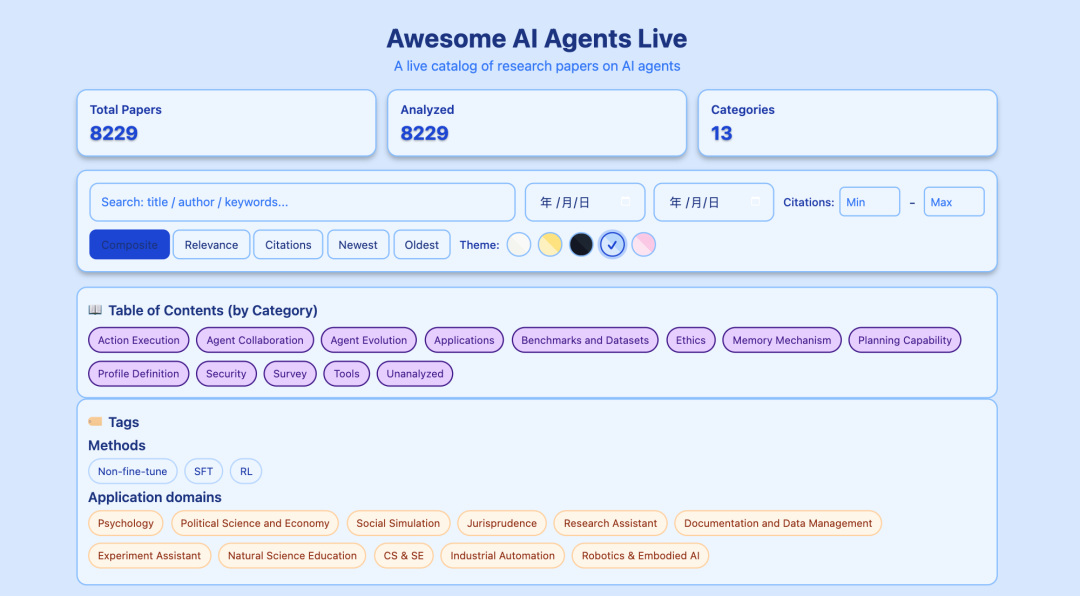
Information integrity: full-dimensional paper interpretation, one-stop grasp of core values
In terms of paper information presentation, "Awesome AI Agents Live" builds a "full-dimensional information matrix" for each analyzed paper. It includes a brief summary, key insights, strengths/weaknesses, tags, and publication metadata, allowing users to grasp the core value of the paper in one stop without having to jump to the original text.
* Summary and Key Insights:The abstract summarizes the core research content of the paper, and the key insights focus on "what industry pain points the research solves" and "what innovative methods are proposed"
* Advantages/Disadvantages:Advantages and limitations of objective annotation techniques
* Tags and publication metadata:Tags are associated with sub-fields such as "memory mechanism" and "multi-agent collaboration", making it easier for users to quickly categorize similar research; publishing metadata includes publication time and author information, helping users judge the academic authority and field relevance of the paper.
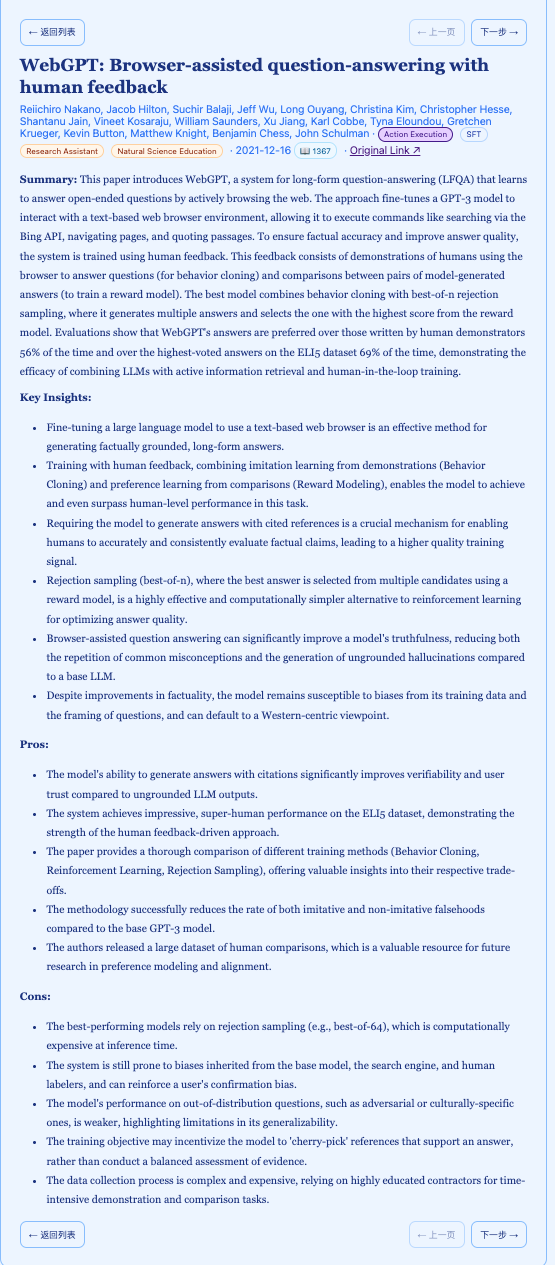
This full-dimensional information presentation makes the value and limitations of each paper clear at a glance, greatly reducing the time cost of users "reading the entire text to obtain key information."
Shanghai Institute of Artificial Intelligence and Finance, East China Normal University
The project author Zou Congyuan and his tutor Wu Zonghan are from the Shanghai Institute of Artificial Intelligence and Finance, East China Normal University.
Shanghai Institute of Artificial Intelligence and Finance (SAIFS) was established in 2023 at East China Normal University. It is the world's first education and research institution built around the intersection of artificial intelligence and finance. SAIFS emphasizes a foundation of general education that goes beyond basic knowledge to cultivate a new generation of leading AI-Fin professionals who integrate financial knowledge, AI technologies, and practical experience. SAIFS remains rooted in the forefront of academic research, exploring new applications of AI in finance and driving the development of AI-Fin. SAIFS is also committed to establishing a broad network of partnerships with academic institutions, financial institutions, technology companies, and government agencies worldwide. By promoting cross-disciplinary research and applications of AI and finance, SAIFS aims to improve the efficiency and quality of financial services and create value for society.
In October 2024, with the support of Xuhui District and East China Normal University,The Shanghai Artificial Intelligence Financial Industry Research Institute and Incubator of East China Normal University (abbreviated as "Shanghai Artificial Intelligence Financial Industry Research Institute and Incubator") has been established in the Xuhui "Mosu Space" large model innovation ecological community.As one of the major cooperative projects of the Xuhui District Big Model, the institute was officially unveiled on May 23, 2025. It aims to smooth the "technology-industry-finance" cycle and create an innovation highland for the deep integration of artificial intelligence and finance.
